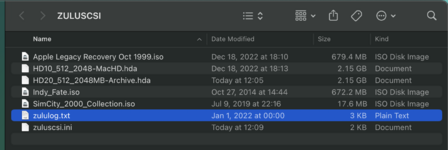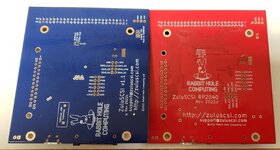Need some help. Trying to figure out two issues I am having while trying to use the ZuluSCSI 1.1 and ZuluSCSI Mini with my Quadra 700.
Issue #1: Use ZuluSCSI 1.1 (internal) and ZuluSCSI Mini (external) at the same time
I have the ZuluSCSI 1.1 as my only internal SCSI device and the ZuluSCSI Mini as my only external SCSI device. The ZuluSCSI 1.1 has termination enabled and the ZuluSCSI Mini doesn’t give you an option (it’s permanently enabled). Note that both units have the latest firmware installed.
I have a bootable image (7.5.5) on both of my SD cards. On one, I have named the image HD1.img and on the second, I have named the image HD5.img. Both the ZuluSCSI 1.1 and ZuluSCSI Mini are connected to my Quadra 700. If I only plug an SD card into my ZuluSCSI 1.1, my Mac boots fine. If I only plug an SD card into my ZuluSCSI Mini, my Mac boots fine. If I have both of my SD cards plugged into the Zulus, my Mac will not boot and gives me a question mark disk icon. Doesn’t matter if I swap SD cards. If I only use one SD card, it boots. If I use both, it does not. I have looked at the log files and both units show that the image is detected properly and no issues. There are no error logs. Enabling Debug = 1 doesn’t seem to give me any additional messages.
Can you only use one Zulu device at a time? I was hoping to have the internal one as my main boot device. And also use an external one to transfer files between Macs.
Issue #2: Using only the ZuluSCSI 1.1, can’t seem to have more than 2 disks on the SD card.
In this scenario, I am only using the ZuluSCSI 1.1 internally. The SD card has three images on it: HD1.img (bootable 7.5.5), CD4.iso (bootable CD which is an Apple recovery disk), HD5.img (blank 2GB disk image). The Quadra 700 refuses to boot (question mark disk icon). If I delete either the CD4.iso or the HD5.img, then the Quadra 700 boots fine. So I can boot with HD1.img and HD5.img, or I can boot with HD1.img and CD4.iso, but I can’t boot if I have all three images on the SD card. Again, the log file shows all three images are detected fine. There is no error log. And enabling Debug = 1 doesn’t seem to provide any additional messages in the log file.
I thought I read you can have multiple images on the SD card and have it work with ZuluSCSI 1.1. I must be doing something wrong?
Any help greatly appreciated, thanks!



